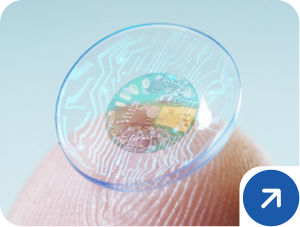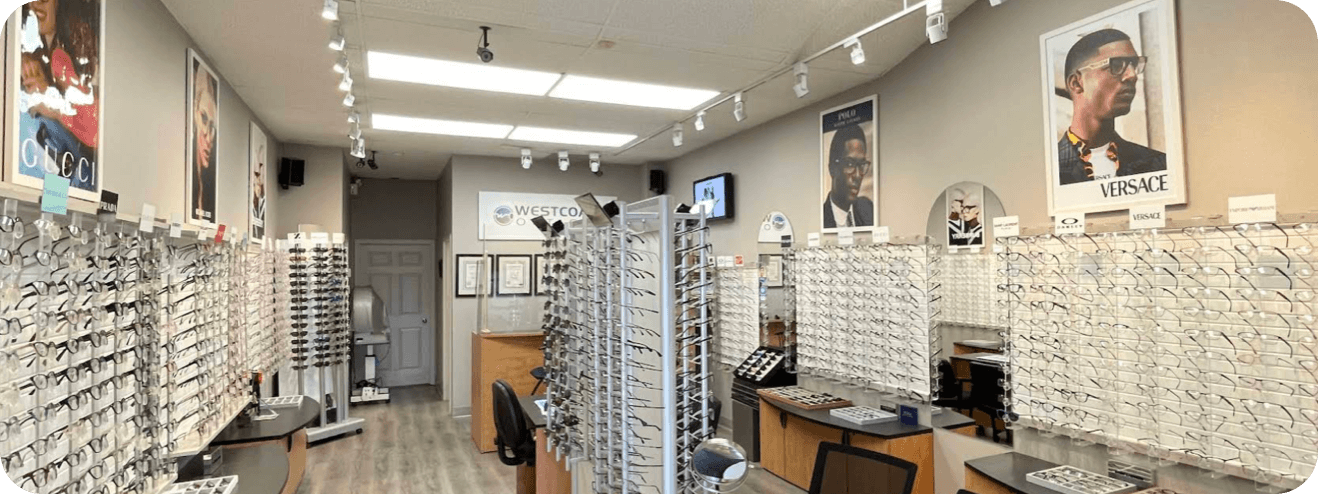Imagine a world where your vision gradually narrows, like a tunnel slowly closing in. The silent thief of sight, known as glaucoma, can sneak up without warning until there is significant damage. Understanding this group of eye diseases is essential because glaucoma has a hereditary component along with other risk factors.
The fact that glaucoma can begin developing with little to no symptoms, along with its genetic risk factor, highlights the importance of getting regular comprehensive eye examinations as recommended by your eye doctor and the Canadian Association of Optometrists.
What Is Glaucoma?
Glaucoma is a group of eye diseases that damage the optic nerve, often due to high pressure within the eye. It’s the leading cause of irreversible vision loss in Canada. The optic nerve is essential for vision, as it transmits visual information from the retina to the brain. When this nerve is damaged, it can lead to irreversible vision loss.
There are several types of glaucoma. The most common type—accounting for 90% of glaucoma cases—is primary open-angle glaucoma, where the drainage canals in the eye become clogged over time. This leads to increased eye pressure, gradually damaging the optic nerve. This type often has no symptoms until significant vision loss occurs.
Another type is angle-closure glaucoma, which is less common but more severe. It occurs when the drainage canals are blocked, causing a sudden rise in eye pressure. Symptoms can include severe eye pain, nausea, and sudden visual disturbances. Immediate medical attention is crucial to prevent permanent vision loss.
Other types of glaucoma include:
- Normal-tension glaucoma: Exists while eye pressure remains normal
- Secondary glaucoma: Caused by other factors, such as eye injury, other conditions, or injury
- Pigmentary glaucoma: Caused by tiny pigment granules
- Congenital glaucoma: Caused during a baby’s eye development
- Traumatic glaucoma: Can be the result of blunt trauma or penetration injuries in the eye
Symptoms of Glaucoma
Glaucoma is often called the “silent thief of sight” because it typically progresses without noticeable symptoms until there is substantial damage. However, some signs can indicate its presence, like:
- Gradual loss of peripheral vision
- Blurry vision
- Halos around lights
- Tearing
- Eye pain
- Rapid vision loss
If you experience any of these symptoms, it’s essential to consult an eye care professional promptly. None of the above symptoms guarantees glaucoma, but they could indicate that other problems at work require a doctor’s attention.
Importance of Early Detection
Early detection of glaucoma is crucial in preventing significant vision loss. Regular eye exams are the best way to catch the condition early, especially for those with a family history. During an eye exam, your eye care professional can check your eye pressure, inspect the optic nerve, and test your peripheral vision. These tests can detect glaucoma before symptoms appear, allowing for timely intervention.
According to the Canadian Association of Optometrists, most individuals should get a comprehensive eye exam every 1 to 2 years, depending on age and other health considerations. But you should always follow your eye doctor’s recommendations, as they consider your unique situation.
Hereditary Factors in Glaucoma
Research shows that genetics play a significant role in the development of glaucoma. The most common form—primary open-angle glaucoma—is directly linked to genetics. If you have a family history of the condition, your risk of developing it increases.
But it’s important to note that simply having family members with glaucoma doesn’t guarantee you will develop glaucoma. Other factors, like overall eye health, also contribute to the condition. Understanding your genetic predisposition can help you take proactive steps to monitor and manage your eye health effectively.

Managing Hereditary Glaucoma
While there is no cure for glaucoma, several treatments can help manage the condition and prevent further vision loss. The most common treatments include:
- Medications: Eye drops or oral medications can help reduce eye pressure by decreasing fluid production or improving drainage.
- Laser therapy: Procedures like laser trabeculoplasty can improve drainage in the eye, reducing pressure.
- Surgery: Surgical options like trabeculectomy or drainage implant surgery can create new pathways for fluid to exit the eye for more advanced cases.
Specific lifestyle changes can also help manage glaucoma in addition to medical treatments. Maintaining a healthy diet, exercising regularly, and avoiding smoking support overall eye health. It’s also essential to protect your eyes from injury and follow your doctor’s recommendations for monitoring and treatment.
Don’t Wait to Book Your Next Exam
Understanding glaucoma and its hereditary nature is crucial for protecting your and your loved ones’ vision. By recognizing the signs, getting regular eye exams, and following
Taking charge of your eye health can seem daunting, but it’s vital to preserving your vision. Glaucoma may be a silent thief, but with early detection, proper management, and the support of your eye care professional, you can keep it at bay.
Call our experienced team at West Coast Optical for more information on glaucoma and your overall eye health. We’re happy to schedule you for a comprehensive eye examination with one of our eye doctors.















